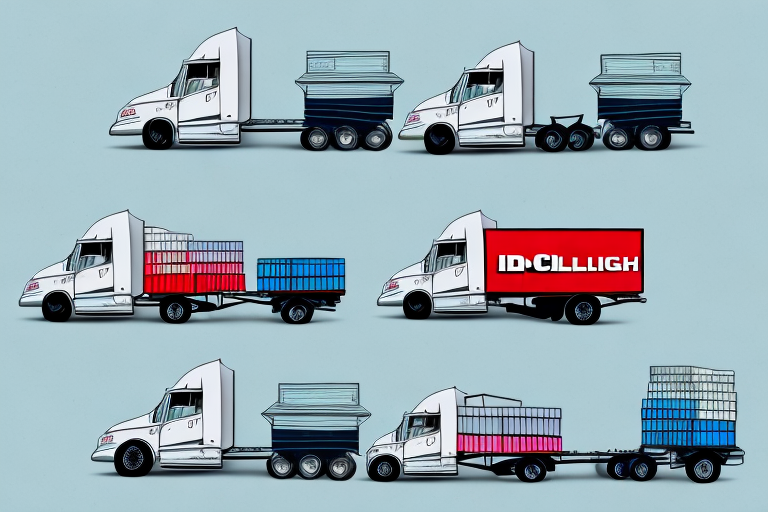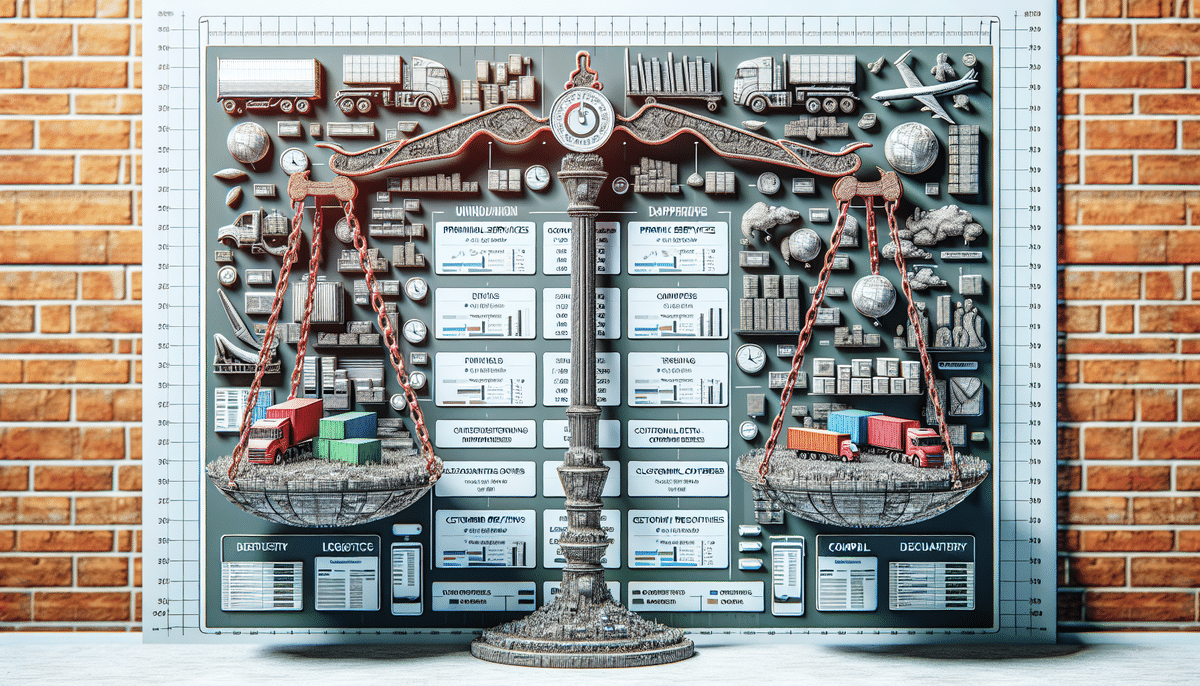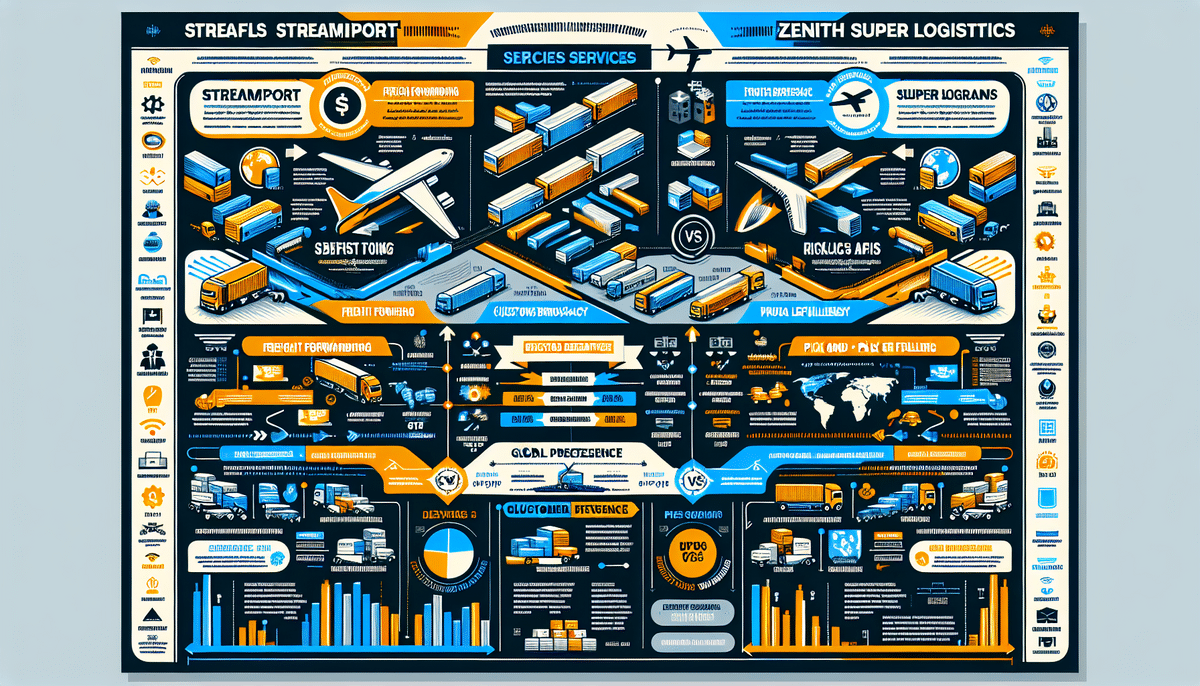DHL eCommerce vs FedEx
In today's global market, shipping and logistics companies are vital for businesses to deliver their products to customers. Two major players in the industry, DHL eCommerce and FedEx, are popular choices for businesses of all sizes. However, determining the right shipping provider can be challenging. This article compares the services offered by DHL eCommerce and FedEx to help you make an informed decision.
Introduction: Understanding the Differences between DHL eCommerce and FedEx
Before diving into the specifics of each company, it's essential to understand their fundamental differences. While both DHL eCommerce and FedEx provide shipping and logistics services, they differ in their approach, pricing, and network coverage.
DHL eCommerce is a branch of the larger DHL organization, renowned for providing express courier services worldwide. DHL eCommerce specializes in helping businesses ship low-value eCommerce items, such as clothing, toys, and electronics, both overseas and domestically. In contrast, FedEx offers a diverse range of services catering to individual consumers, small businesses, and enterprise corporations. FedEx Express provides express transportation for time-sensitive shipments, while FedEx Ground offers ground shipping for less urgent parcels.
One significant difference between DHL eCommerce and FedEx is their pricing structure. DHL eCommerce offers competitive pricing for eCommerce businesses, with flexible rates based on the weight and destination of the package. In contrast, FedEx's pricing is generally higher, but they provide a wider range of services and faster delivery options.
Another difference is their network coverage. DHL eCommerce has a strong presence in Asia and Europe, making it ideal for businesses looking to expand their eCommerce operations in these regions. On the other hand, FedEx has more extensive network coverage in North America, making it a popular choice for businesses operating in the United States and Canada.
Worldwide Reach: Which Company Has a More Extensive Network?
One of the most significant considerations when selecting a shipping provider is their network coverage. You wouldn't want to choose a company that doesn't deliver to your desired destination.
DHL eCommerce operates in over 220 countries and territories worldwide, making it one of the most extensive shipping networks globally. DHL's robust network enables businesses to reach a vast customer base without worrying about shipping restrictions. Conversely, FedEx also operates in over 220 countries and territories, offering a solid choice for businesses requiring broad network coverage.
However, it's not just about the number of countries a shipping provider operates in—the quality of their network is also crucial. DHL has heavily invested in its infrastructure, including state-of-the-art sorting facilities and advanced tracking technology, ensuring packages are delivered quickly and efficiently, even in remote locations.
Similarly, FedEx is renowned for its reliable and efficient delivery service. The company boasts a vast fleet of planes and trucks, enabling them to transport packages swiftly. Additionally, FedEx is committed to sustainability, aiming to achieve carbon-neutral operations by 2040.
Delivery Speed: How Fast Are Deliveries with DHL eCommerce Compared to FedEx?
Delivery speed is critical for eCommerce shipments. Customers expect their orders to arrive promptly, and delays can lead to negative reviews and loss of business.
DHL eCommerce offers flexible delivery options, including standard, expedited, and express delivery. Standard shipping typically takes 5-7 business days, while expedited options promise delivery within 2-3 business days. DHL eCommerce's express shipping can deliver parcels within 1-2 days, making it ideal for businesses with time-sensitive shipments. In comparison, FedEx offers a similar range of delivery options, with expedited shipping promising delivery within 1-3 business days. Additionally, FedEx provides same-day delivery options for urgent shipments.
It's important to note that delivery speed can also depend on the destination and the size of the package. Both DHL eCommerce and FedEx have strong global networks, ensuring reliable delivery to customers worldwide. However, FedEx's delivery times may vary more depending on these factors.
Shipping Costs: Which Company Offers Better Rates for Your Business?
Price is a significant factor for most businesses, especially small businesses and startups. Shipping costs can eat into profits, making it challenging to stay competitive.
DHL eCommerce employs a pricing strategy based on weight and zones. As the weight of the package increases, so does the price. DHL eCommerce offers discounts for businesses shipping in bulk, making it a cost-effective option for small businesses shipping large quantities of low-value items. FedEx has a similar pricing policy, with rates based on the size, weight, and destination of the package.
However, both companies offer additional services that can affect the overall cost. For example, DHL eCommerce offers package tracking and insurance for an additional fee, while FedEx provides same-day delivery and international shipping options. These added services may be necessary for some businesses but can also increase shipping costs.
Another factor to consider is the reliability of each company's shipping services. While both DHL eCommerce and FedEx have good reputations for timely delivery, there may be differences in their handling of packages and customer service. Researching each company's reviews and ratings can help determine which one best fits your business needs.
Tracking Capabilities: Which Service Provides Better Visibility and Tracking?
Effective tracking and management of shipments are essential. Real-time tracking capabilities are crucial when selecting a shipping provider.
DHL eCommerce offers excellent tracking and visibility of shipments through its online portal, enabling businesses to monitor packages from start to finish. Automated tracking notifications are sent to customers via email or SMS. FedEx provides equally impressive tracking capabilities, with real-time updates and delivery notifications sent throughout the shipment process.
Additionally, DHL eCommerce offers advanced tracking features such as GPS tracking for high-value shipments, allowing businesses to monitor the exact location of their packages in real-time. Customized tracking reports tailored to a business's specific needs provide valuable insights into shipment trends and performance.
Customs Clearance: How Do DHL eCommerce and FedEx Handle Customs Clearance?
International shipments require careful handling of customs clearance, a complex process that demands attention to detail. Navigating customs regulations and procedures can be daunting, especially for small business owners.
DHL eCommerce provides comprehensive customs clearance services, including customs documentation preparation and customs brokerage handling. These services make international shipping hassle-free, ensuring packages clear customs in a timely and efficient manner. FedEx also offers customs clearance services, helping businesses comply with foreign customs regulations and ensuring packages reach their destinations quickly and efficiently.
One key difference is their approach to handling duties and taxes. DHL eCommerce offers a Duty and Tax Paid (DTP) option, where they pay the duties and taxes on behalf of the recipient, ensuring the package is delivered without additional charges. Conversely, FedEx offers a Duty and Tax Unpaid (DTU) option, where the recipient is responsible for paying duties and taxes upon delivery.
Another consideration is their global reach. DHL eCommerce has a strong presence in emerging markets like Asia and Africa, making it a good choice for businesses looking to expand into these regions. FedEx, however, has a larger network in North America and Europe, making it better suited for businesses shipping to these areas.
Customer Service: Which Company Offers Better Customer Support?
Customer service is a critical factor when selecting a shipping provider.
DHL eCommerce provides extensive customer service options, including online and phone support, 24/7 assistance, and a dedicated eCommerce customer service team. Their team is knowledgeable, responsive, and committed to assisting customers throughout the shipping process. Likewise, FedEx offers exceptional customer service options, including online chat, phone support, and email assistance. FedEx's customer service team is available 24/7 to address all customer queries.
However, DHL eCommerce generally has a better track record in resolving customer complaints efficiently. According to customer reviews, DHL eCommerce's customer service team handles complaints and resolves issues more promptly compared to FedEx, where some customers have reported delays and unsatisfactory responses. Therefore, if quick and efficient complaint resolution is a priority, DHL eCommerce may be the better option.
Packaging Requirements: What Are the Packaging Guidelines for DHL eCommerce and FedEx Shipments?
Effective packaging is crucial to ensure that packages reach their destinations intact and in good condition. Both shipping providers have specific packaging guidelines that businesses must adhere to.
DHL eCommerce enforces stringent packaging guidelines, requiring packages to be tightly packed, well-cushioned, and made from durable materials. Shipments must be correctly labeled, and any necessary customs documentation must be included. Similarly, FedEx has specific packaging guidelines that emphasize the use of sturdy boxes, cushioning materials, and clear labels to ensure packages are correctly identified and handled throughout the shipping process.
Insurance Coverage: What Are the Insurance Options with DHL eCommerce and FedEx?
Ensuring packages are adequately insured is essential to protect against damage or loss during shipping.
DHL eCommerce offers insurance coverage ranging from $100 up to $5,000 per package. Businesses can opt for additional coverage depending on the value of their shipments. FedEx provides similar insurance coverage options, ranging from $100 up to $50,000 per package.
Special Services: How Do DHL eCommerce and FedEx Compare on Special Services like Same-Day Delivery or Signature Confirmation?
Special services such as same-day delivery and signature confirmation can add convenience for customers.
DHL eCommerce offers a range of special services, including same-day delivery, package pickup, and signature confirmation. FedEx provides special services like delivery customization, scheduled delivery, and Saturday delivery.
Conclusion: Which Shipping Provider Is Right for Your Business?
Ultimately, the right shipping provider for your business depends on your specific needs and requirements. Both DHL eCommerce and FedEx offer reliable shipping and logistics services, comprehensive tracking capabilities, excellent customer support, and competitive pricing. However, DHL eCommerce excels in international shipping, particularly in Asia and Europe, while FedEx offers a broader range of shipping options and a stronger presence in North America. Carefully weighing the pros and cons of each provider will help you make the best decision for your business.









